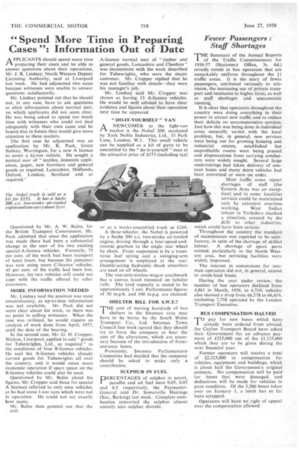Fewer Passengers : Staff Shortages
Page 54

If you've noticed an error in this article please click here to report it so we can fix it.
THE Summary of the Annual Reports. of the Traffic Commissioners for 1956-57 (Stationery Office, 3s. .6d.) revedis trends in bus operation that are remarkably uniform throughout the 11 traffic areas. It is the story of fewer passengers, attributed variously to television, the increasing use of private transport and resistance to higher fares, as well as staff shortages and uneconomic running.
It is dear that operators throughout the country were doing everything in their power to attract new traffic and to reduce their deficits on unremunerative• services. Just how this was being done in individual areas naturally varied. with the local problem, but, in general, new services were being run for growing housing and industrial estates, established but -unprofitable routes were being pruned and dispensations from carrying conductors were widely sought. Several large undertakings had taken delivery of oneman buses and many more vehicles had been converted or were on order.
I Most traffic areas report
shortages of staff • (the Eastern Area was an exception) and in some localities services could be maintained only by extensive overtime working. West Indian labour in Yorkshire checked a situation, created by the drift to other industries, which could have been serious.
Throughout the country the standard of maintenance was reported to be satisfactory, in spite of the shortage of skilled labour. A shortage of spare parts existed, particularly in the North Western area, but servicing facilities were widely improved.
The interest in conversions for one• man operation did not, in general, extend to crush-load buses.
During the year under review, the number of bus operators declined from 4,861 in March, 1956, to 4,710; vehicles also showed a drop from 66,578 to 66,419, excluding 7,758 operated by the London Transport Executive.
BUS COMPENSATION HALVED
TO pay for new buses which have already been ordered from abroad, he Ceylon Transport Board have asked their Government for an advance payment of £525,000 out of the £1,125,000 which they are to he given during the next financial year.
Former operators will receive a total of £2,325,000 in compensation for vehicles, equipment and buildings, which is about half the Government's original estimate. No compensation will he paid for buses thatwere damaged, and deductions will be made for vehicles in poor condition. Of the 3.200 buses taken over on January 1, a tenth has so far been scrapped.
Operators will have no right of appeal over the compensation allowed.








































































































































